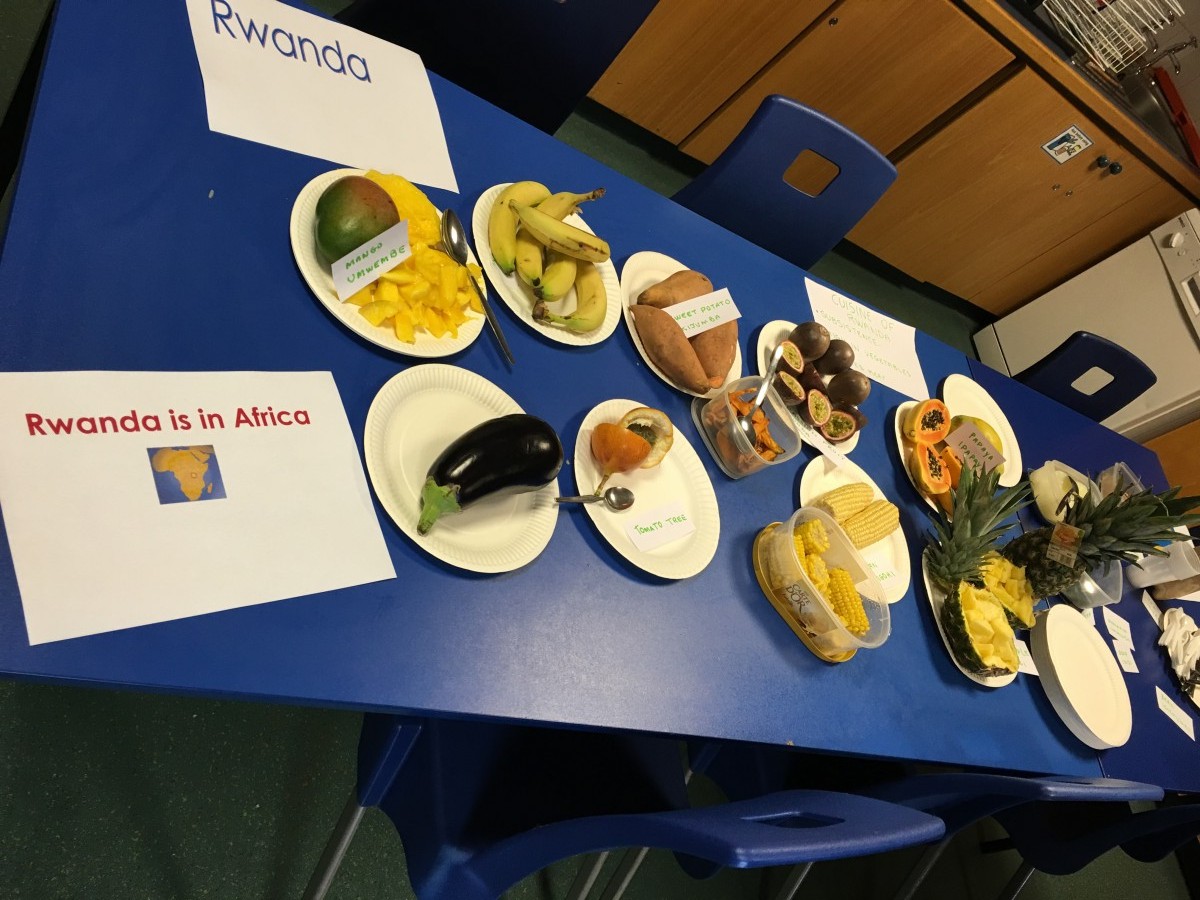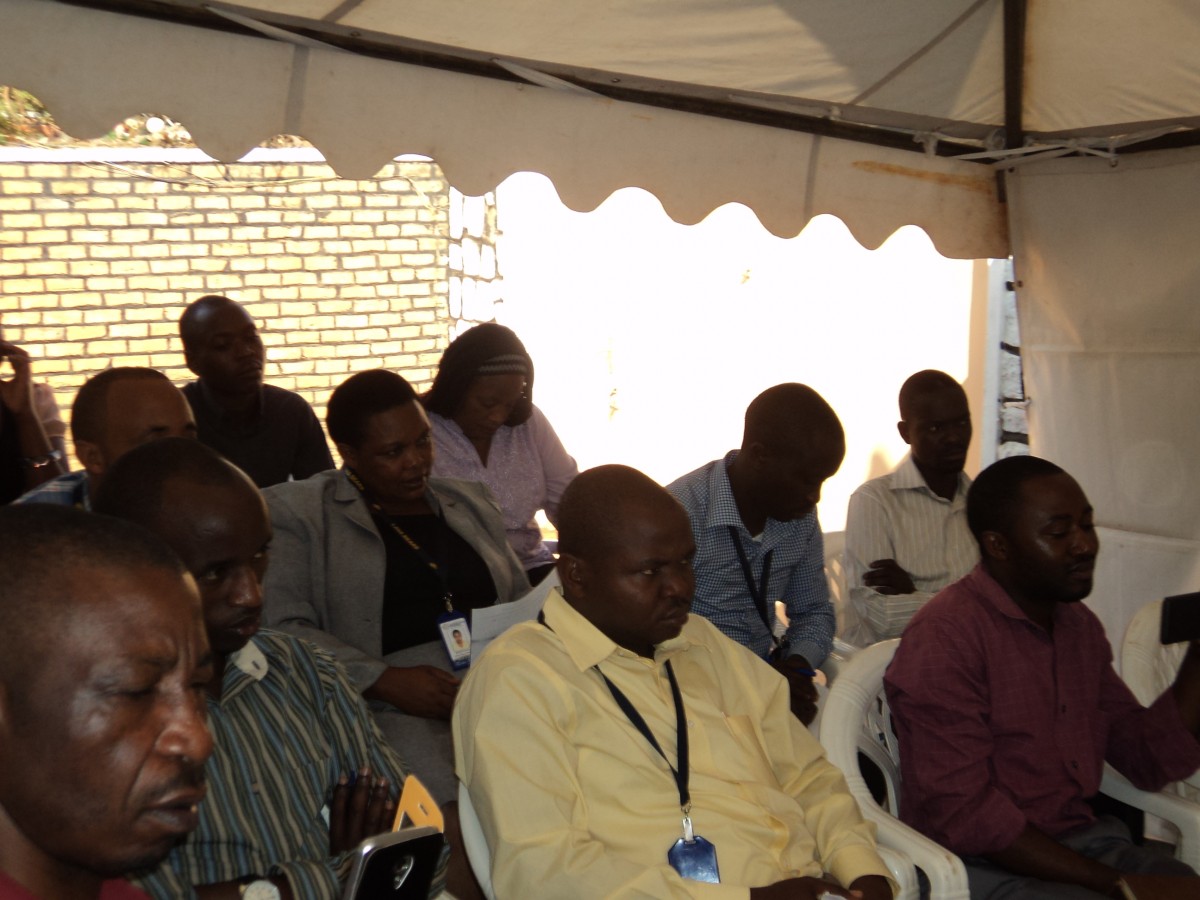A Western traveller to Africa some time age, working to a tight schedule was annoyed when, after a few days, his guides refused to move on. ‘This is a waste of valuable time. Can someone tell me what’s going on here?, he shouted. The translator looked at him and calmly answered, ‘They’re waiting for their souls to catch up with their bodies.’ Terry Hershey, Sacred Necessities: Gifts for Living with Passion, Purpose, and Grace.
All posts by S. O'Donnell
INTERDISCIPLINARY LEARNING
My experience in Rwanda has enriched my teaching and opened an opportunity to build up an international engagement and partnership across and beyond all subject areas and boundaries. Children and young people can make connections between different areas of learning to develop knowledge and skills are required for life, learning and work.
Pupils of an enhanced provision in secondary school organise a presentation about Rwanda on food, tradition, weather, vegetation and culture.
Everyday meals often consist of bean, vegetable or meat stews. Generally, Rwanda’s food is not particularly hot or spicy. So, we had a lovely tropical lunch with papaya, pineapple, passion fruit, banana, mango, beans, cassava and hot tea (chai or icyayi) which is brewed sweet and milky.
USEFUL WORDS IN KINYARWANDA
| Food: Ibyo Kurya
Bread – umugati Milk – amata Rice – umuceri Beans – ibishyimbo Meat – inyama Pasta – amakaroni Eggs – amagi Fish – amafi Honey – ubuki Cake – igato
|
Fruit and Vegetables:
Banana – umuneke Pineapple – inanansi Potato – ikirayi Avocado – ivoka Mango – umwembe Orange – icunga? Lemons – indimu? Apples – pome Carrots – amakaroti Onion – igitunguru |
School:
Teacher – umwarimu Pupil – umunyeshuri Table/desk – ameza Paper – urupapuru Pen – ikaramu Book – igitabo Computer – mudasobwa Chair -intebe Blackboard – ikibaho Chalk – ingwa
|
Clothes:
Trousers – ipantaro Shorts – ikabatura Skirt – ingutiya Shirt – ishati Dress – ikanzu Pants – ikariso Socks – amasogisi Shoes – inkweto Coat – ikote Jumper – umupira T-shirt – agapira Hat – ingofero |
| Subjects:
Science – siyansi Maths: imibare Art: ubugeni History: amateka Geography: ibidukikije English: Icyongereza Reading: Gusoma Writing: kwandika Health: ubuzima French: Igifaransa Music: umuziki |
Days of the Week:
Monday – ku wa mbere Tuesday – ku wa kabiri Wednesday – kuwa gatatu Thursday – ku wa kane Friday – ku wa gatanu Saturday – kuwa gatandatu Sunday – ku cyumweru gatandatu |
Shapes:
Square:kare Triangle:mpandeshatu Circle: uruziga Rectangle: urkiramende Star: inyenyeri Heart: umutima Kite:akanyanguni Oval:ikinyampande gikoze nk’igi Hexagon: mpandesheshatu Pentagon: mpandeshanu |
Weather:
Sun: izuba Cloud: igicu Rain: imvura Wind: umuyaga Storm: umuhindo w’imvura Thunder/lightening: inkuba/umurabyo Snow: urubura Hail: amahindu Rainbow: umukororombya |
| Colours:
Red – umutuku Yellow – umuhondo Green – icyatsi kibisi Blue – ubururu Orange – ibara ry’ icunga rihishije Pink – roza Purple – viyore Black – umukara Brown – ibihogo White – umweru?
|
Months of the Year:
January – ukwa mbere February – ukwa kabiri March – ukwa gatatu April – ukwa kane May – ukwa gatanu June – ukwa July – ukwa karindwi August – ukwa munani September – ukwa cyenda October – ukwa cumi November – ukwa cumi na rimwe December – ukwa cumi na biri |
Numbers:
One – rimwe Two – kabiri Three – gatatu Four – kane Five – gatanu Six – gatandatu Seven – karindwi Eight – umunani Nine – icyenda Ten – icumi
|
Farm animals:
Cow – inka Pig – ingurube Sheep – intama Chicken – inkoko Horse – ifarasi Goat – ihene Dog – imbwa Cat – injangwe Duck – igishuhe Goose – no Kinyarwanda
|
| African animals:
Lion – intare Elephant – inzovu Giraffe: musumbashyamba Chimpanzee:inguge Gorilla: ingagi Zebra: imparage Crocodile: ingona Hippopotamus: imvubu Rhinoceros: inkura vulture:inkongoro
|
People who help us:
Doctor – umuganga Nurse – umuforomo Policeman – umuporisi Teacher – umwarimu Vet – umuveterineri/ umuvuzi w’ amatungo Farmer – umuhinzi Priest – umuvugabutumwa Chef – umuyobozi Mother – mama Father: papa Grandmother: nyogokuru Grandfather: sogokuru |
The body:
Arm – ukuboko Leg – ukuguru Head – umutwe Eyes – amaso Nose – izuru Ears – amatwi Mouth – akanwa Hands – ibiganza Fingers – intoki Feet – ibirenge Toes – amano Knees – amavi Shoulders – intugu Elbows – inkokora Neck – ijosi |
Hair – umusatsi
Teeth – amenyo Chin – akananwa
|
NGUNDA HOW RWANDA’S RIVERS AND LAKES WERE MADE
In Rwanda, this is a traditional tale about Ngunda, a glutton and giant. It is because of him that Rwanda’s rivers and lakes were formed. The children in the Pr 6/7 Enhanced Provision Unit at Banff Primary School enjoyed hearing the story and making their animation.
I TRACKED MOUNTAIN GORILLAS IN RWANDA
I tracked Mountain Gorillas in Rwanda ISABUKURU GROUP and Cultural Village.
I had an amazing adventure in July 2015, with the mountain gorillas in volcanoes National Park in Rwanda. I was on a 30-day trip in Rwanda and I had a gorilla trekking tour organised by Eco Tours. A deposit of 50% (£420) was wired transferred to secure a place and pay the permit two months before the trip. The tour company booked the hotel and got the permit, thankfully strictly controlled and limited to about 80 people a day. The remain balance (£450 including transfer cost and exchange rate) was due one month before the trip. On the way back from the Gorillas, the company added value option of seeing the twin lakes, Lake Burera and Lake Ruhondo.
It is a top life experience ever!
NATIONAL AKAGERA PARK RWANDA – Film
Certainly the pictures will speak for themselves. So much to tell and see! The animals are amazing! They hang out in the background, they cross the road, they pause to model and they merge their surroundings.
I advise you to look really closely at the grass, the bushes and the animals. You can be surprised by a bird and of course you can miss the shot. Prepare your camera and do not get out of the car, because elephants, hippos, crocodiles, giraffes and other animals. Look very, very closely at the landscape. You usually can see distinctive shapes! Giraffes are magnificent and charming!
SCHOOL BASED MENTORING
The mission of transforming the education in Rwanda is the focus of IEE (Inspire Educate and Empower Rwanda) to improve English language skills for educational practice and teaching.
It was working with teachers and mentors in Rwanda that I realised they are all eager to learn and motivated to use English as an instrument for teaching and learning. They can move from Kinyarwanda to English language remarkably well. This practice provides an appropriate insight of different context and a huge impact for teaching and learning.
GLP RWANDA 2015 FILM
I can watch this film over and over again and never get tired of it.
It brings smiles, tears and memories that will never be forgotten. The trip to Rwanda began with an insatiable curiosity about the country and the people. I am still asking myself what surprised me about Rwanda. After long hours on the plane from Aberdeen (UK) to Kigali (Rwanda) I could sense greater calm. The country has some incredibly landscape with thousand of mountains. I cannot forget to mention lakes, volcanos, the local market and the greatest opportunity I had to live and feel Rwandan everyday life. I walked the wide dust street of Ruhuha and the clean street of Kigali. I saw lots of motorcycle and bicycle taxi drivers. There was so much that I had to digest emotionally, such as the genocide museums and memorials.
I also had my days of a tourist as most travellers have. I was fortunate to go gorilla mountain trekking at Volcanos National Park, explore Akagera National Park and Lake Kivu. We all had time to be on the road at the weekends and take time to relax and talk about our experiences.
Curiosity: the Rwandan people take very serious the approach which bans plastic bags since 2006. For several times I went shopping and the store provided paper bags. It works and it is really inspiring.
I was amazed with what Rwandan people can carry on their heads. The women walk with an incredible elegant posture, strength and beauty with a perfect erect neck with baskets, food and bags on their heads.
However I admit that I did not have the patience to wait for several hours to be served in the restaurants. I have no idea of what goes on in the kitchen and why it takes hours to prepare a simple salad with fries. Most of the time, I preferred to get some snack from the market such as fresh fruit, baked corn, baked potato, popcorn, yogurt and samosa.
Communication is not a problem at all. In Rwanda you can speak French, English, Kinyarwanda and a mix of the three languages. The culture, the dance and rhythm of the drums speak for themselves. I felt part of the culture.
SCOTLAND IN RUHUHA
It was a sunny day as all the other days since I arrived in Rwanda. The school was always a busy place and I used to spend time with students and teachers. That day was not different. After many hours in the library listening the students’ reading, I heard my name out loud from outside. It was a mix of anxiety, happiness and emotion when I saw my colleague from Angus, Scotland, and his family. I was delighted with the visit and the lovely experience to see familiar faces being so far from home.
What a great opportunity to take them around the school to introduce GS Rango, the staff and the students.
Literary it was Scotland in Ruhuha.
BANANA SHOPPING
As a Brazilian, banana has been always part of my everyday life. My mum used to plant it in the garden and the harvest was usually plenty for eating, making sweets and sharing with my neighbours. So, when I saw the banana plantation in Rwanda I thought that I could have it any time I wanted. However, the story was a little bit different. Have you ever tried to go shopping in Ruhuha?
It was Tuesday morning on my way to school when I decided to buy some bananas. It was a market day usually when you can buy anything you want. How difficult it can be! Well, certainly you need a good knowledge of Kinyarwanda if you want to negotiate the price.
On the side of the road close to the school I saw this lady that had a supermarket basket of bananas. I was feeling confident that I could negotiate the price as I wanted to buy everything. Those bananas would make everybody very happy at lunch time as we all love banana.
So, I asked the price to the lady: Angahe? How much?
The lady was not sure how much she should charge the bananas from me (muzungu). Waiting for a response and while she was trying to think, a man jumped in and said: Rwf 40000. Believe me, it means about £40. Disappointed I went to school and told my colleagues about my attempt to buy bananas for our lunch. They all laughed and said that it was too much. Besides, the bananas were not beautiful.
Happily we got the same amount of bananas for Rwf 500 from another vendor for our lunch.


















